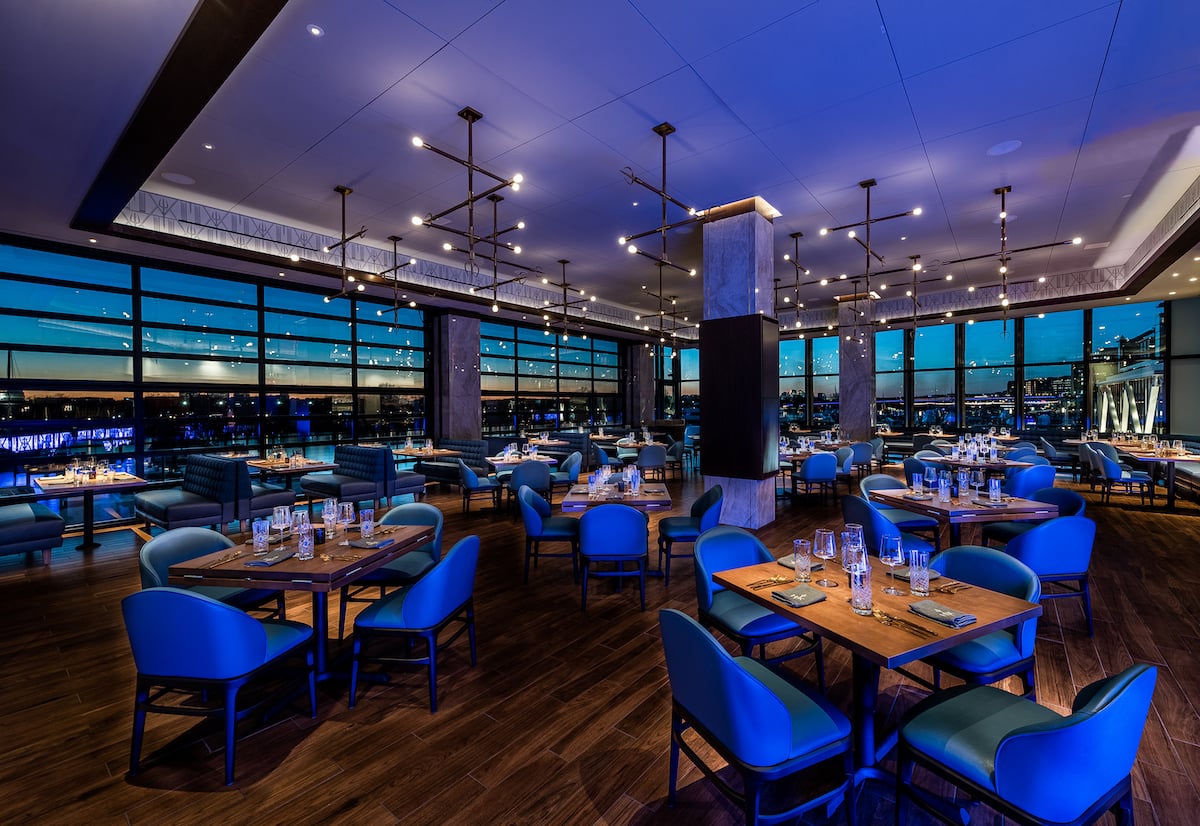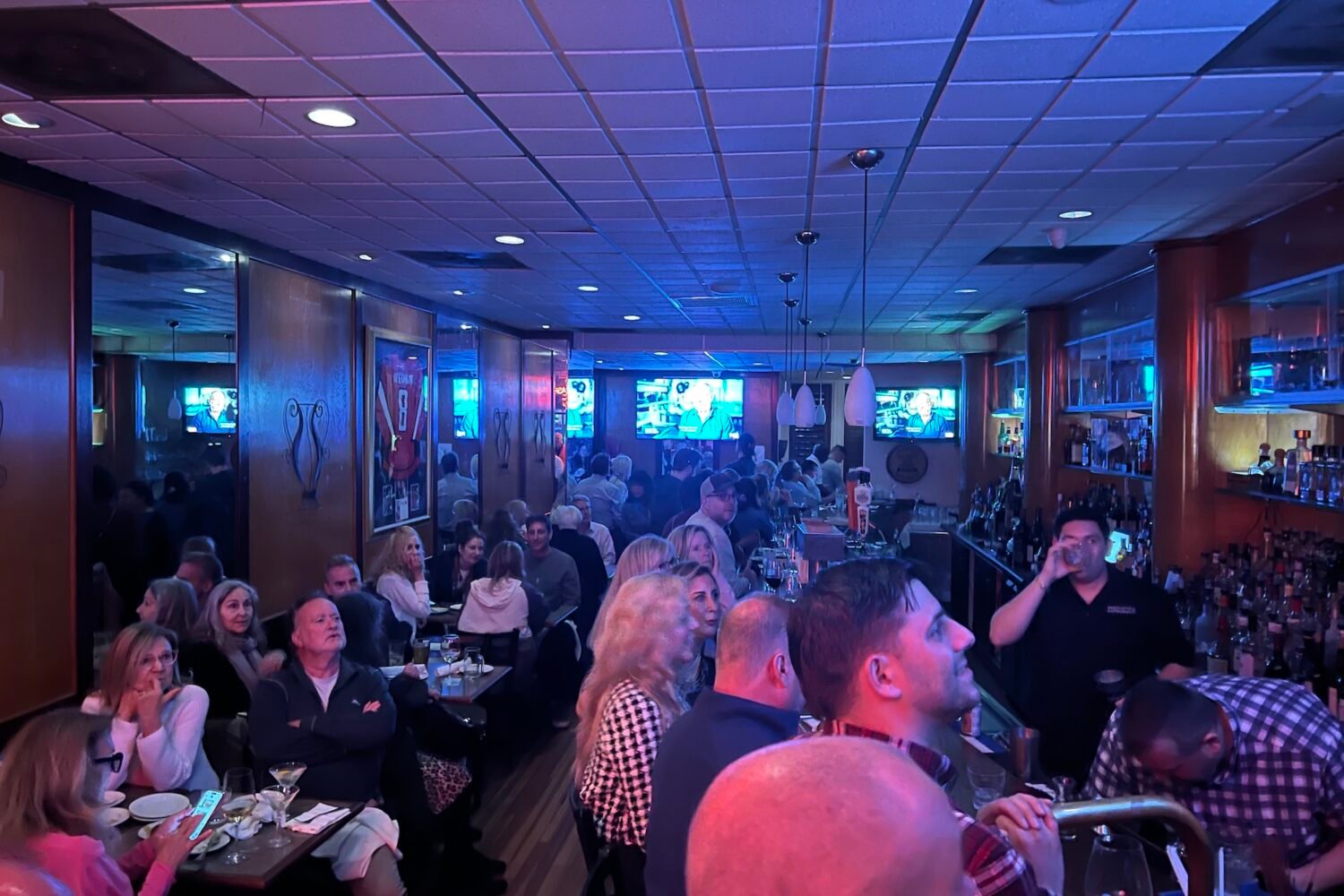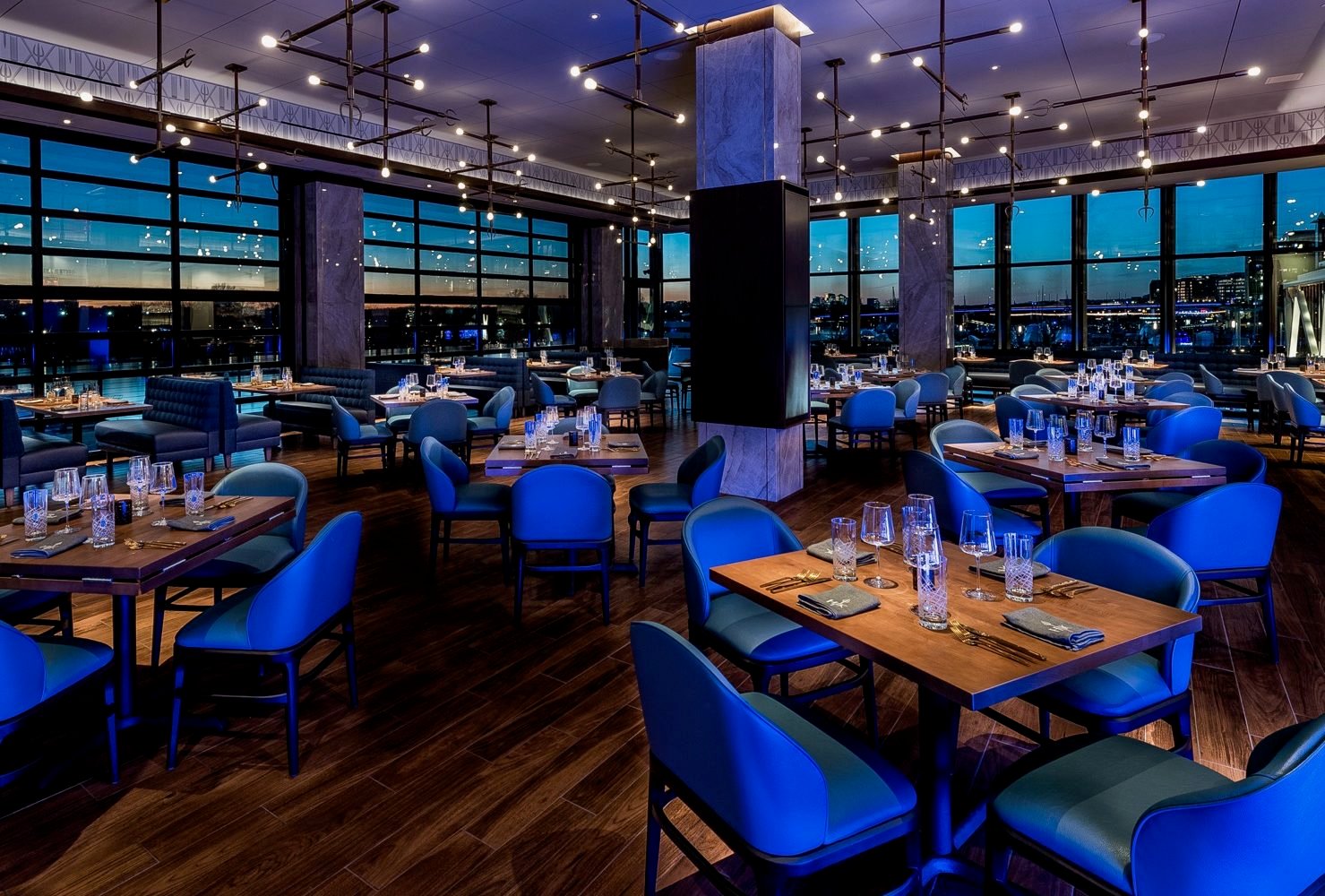Eleven employees of Gordon Ramsay’s Hell’s Kitchen at the Wharf in DC walked out on Labor Day following allegations of a toxic and racist work environment. They claim a lead host segregated Black customers in what she allegedly referred to as the “ghetto” side of the dining room with lesser views. They also allege that one of the managers created a hostile workplace, calling some employees “incompetent bitches,” punching the wall on multiple occasions, and throwing a ladder at a window.
When the employees demanded the manager be put on investigative leave before they returned to work, Ramsay’s corporate HR suspended them. Many believed they’d essentially been fired, but after Washingtonian requested comment from Ramsay’s restaurant group, they were asked to come back as HR continued its investigation. Employees say the manager was sent home the day after their walkout, but the company has declined to comment on the employment status of specific employees. A source tells Washingtonian that the company is reviewing video footage of the dining room, and so far, they’ve found no racial disparity in the way guests were seated. They say the investigation was “immediate and ongoing.”
“These alleged actions are never permitted or tolerated within the organization,” Gordon Ramsay North America said in a statement. The company says it has a “strict policy” of equitable treatment of employees and guests that is detailed in its staff orientation and training. “Customers on multiple occasions request specific seating or changes at the last minute to enjoy different views or a quieter table, which we gladly honor….and should not be misconstrued. GRNA has been in the process of investigating these allegations.”
Washingtonian spoke to six current and former employees who say they observed blatant racial segregation of the restaurant. They all asked to remain anonymous because they feared retaliation. After Washingtonian began reporting this story, the company sent employees a page-long memo warning them not to make unauthorized statements about the business to the media. Just as Ramsay’s TV show Hell‘s Kitchen divides teams into red and blue, the color scheme of Wharf restaurant is likewise split between red and blue dining rooms. Servers say the blue dining room, considered the “better” section because of its waterfront views, is where the restaurant often sat VIPs and others perceived to be big spenders.
One server says he first noticed a racial divide in August after a colleague pointed it out to him: “I walked on both sides of the restaurant, and of course, it was true. There were only Black people sitting on the red side of the restaurant. And there were only white people sitting on the blue side. Completely segregated.”
Another server says around the same time he independently noticed that all the diners in his section were Black or other non-white people. “For a second, I just wanted to give the benefit of the doubt. Maybe it’s just a night where the restaurant is just filled with one type of person. I just looked around, and I’m like, ‘Oh, that’s not the case’… It looks like my section has been tampered with.” He says he soon learned that many of his colleagues had allegedly experienced the same thing.
A third server says the racial segregation was also evident, but the server preferred to try to make the best of it because it was still a good job. “I can tell you right now that right before close, they’re going to give one of the Black [servers] the table with five, seven people from inner city Baltimore, but they won’t give it to these other people,” the server says.
The employees say the guest seating chart at the time was determined by lead host Ingris Urrutia, though hosts do not control which sections servers are assigned to. When the staff brought the segregation they say they observed to the attention of general manager Natasha Mtshali last month, she said she would investigate. Several employees were interviewed by the Wharf restaurant’s managers and supplied written statements detailing racist behavior they said they had witnessed. Some of those statements included allegations that Urrutia called the red side of the restaurant the “ghetto side” and that she had referred to some Black guests as the N-word. Afterward, employees say Urrutia was removed from controlling the seating chart but continued to work as a host. They say guests are now seated more normally.
Urrutia acknowledged a request for comment from Washingtonian, detailing the accusations against her but did not respond to them.
One source says some people didn’t initially speak up because Urrutia seemed to be friends with her supervisor, Philip Kirby, who employees say they perceived as hostile and retaliatory. They say Kirby made belittling comments and had unpredictable outbursts. One server says Kirby would call servers “incompetent bitches” under his breath anytime someone made a mistake or he had to comp a dish. “That’s just one of his catchphrases,” the server says. Multiple employees claim he would unfairly punish minor mistakes by giving out disciplinary write-ups or less lucrative shifts and sections. They also allege he had punched a wall on multiple occasions. Last Thursday, August 31, during service, things seemed to escalate when he allegedly threw a ladder, out of view from guests, “almost shattering the window because he was so angry.” It’s unclear exactly what made him angry enough to allegedly throw the ladder.
Washingtonian reached out to Kirby via his Facebook and LinkedIn pages for comment, detailing the accusations against him. He did not respond.
After the alleged ladder incident, “the servers let management know, ‘Hey, we don’t feel safe when he’s in the building. He’s creating a hostile environment,'” one of them says. But despite complaints from staff to other managers about his behavior, Kirby continued to work over the next few days. On Sunday, the day before the walkout, the servers say Kirby lashed out again, yelling at employees and telling them not to talk to him. “The place was just very, very toxic. Everyone was just on pins and needles,” one person says.
On Monday, September 4, a group of employees agreed they didn’t feel comfortable being in the building with Kirby. They gathered—in uniform, ready to work—at nearby Wharf restaurant Lucky Buns before their shift but told managers they would not come in if Kirby was there.
General Manager Mtshali and another manager met the group at Lucky Buns to talk, and at this point, Ramsay’s corporate HR got involved. The employees passed around the phone, each sharing their concerns with Chief People Officer Dona Costa. They say Costa told them that they’d handled the situation incorrectly by not going through the “appropriate channels” to report problems. They say Costa told them she was not aware of all the complaints and written statements they’d submitted to Wharf managers alleging racist and retaliatory behavior.
Costa told them they would not be allowed to return to the restaurant while the issue was investigated. The next day, the employees who’d taken a stand received a follow-up email from Costa informing them they’d been placed on leave until further notice. They’d also been locked out of the scheduling platform. “Disruption to the business and our customers will not be tolerated, nor will abandonment of your job,” Costa’s email read in part.
The employees dispute the idea that they didn’t handle their complaints appropriately: “They said, basically, they had an open-door policy and we could have come to them at any time. But we came to our managers. We went to the people that we see everyday, that we would come to with any problems. But nothing’s ever been done.”
They say it all felt like a huge double standard: Why were they suspended—essentially fired, they believed at the time—for reporting a hostile work environment, while those accused of creating that environment continued to work?
“We basically get punished for being treated unfairly. I just feel like it’s not right. That’s not how you treat people… We don’t get to make money. And then on top of that fact, all 11 of us are minorities,” says one server. “It’s almost like they get the show too caught up in their head like, ‘Oh, it’s Hell’s Kitchen.’ But Gordon Ramsay still has a heart.”
On Wednesday, after Washingtonian had contacted the company about the allegations, employees received another email telling them they could, in fact, return to work as the investigation continued. They were told their “refusal” to work significantly disrupted the business and adversely affected their co-workers. The message also came with a warning: If they didn’t show up for a shift in the future because of who was working, the company would consider that abandonment of their employment.
Most of the employees have decided to return to work, at least for now.
“I would rather work there for a couple more shifts, and then just find somewhere else to go just so there’s no break in my financial situation,” one server explains. “There’s no way that I can continue to work for this company, and all of these injustices went blind. There’s no way. Morally, I can’t do it.”


















